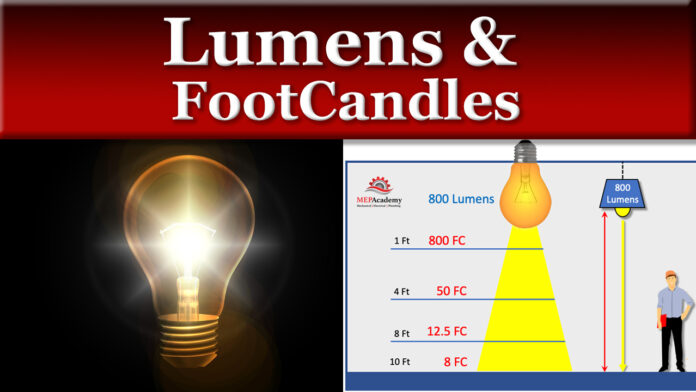Lumens and Footcandles. We’ll show you how to choose the correct light bulb when switching out an old incandescent bulb, we’ll explain lumens, footcandles and Lux for those using the metric system. We’ll show you how footcandles change with the square of the distance, and how to calculate foot candles.
If you prefer to watch the YouTube version of this presentation, scroll to the bottom.
Replacing Light Bulbs – Buy the Lumens, Not the Watts
It used to be easy to switch out incandescent light bulbs based on how many watts they used, because all you had to do was go to the store and pickup one that matched the watts. With the need for increased energy efficiency and the increased use of LED lights, this doesn’t work anymore.
The latest bulbs use up to 80% less power to give you the same amount of light. Switching from incandescent to LED using the same watts doesn’t work. It’s the lumens that you want to match. Buy the Lumens, not the watts. The higher the lumens, the brighter the light.
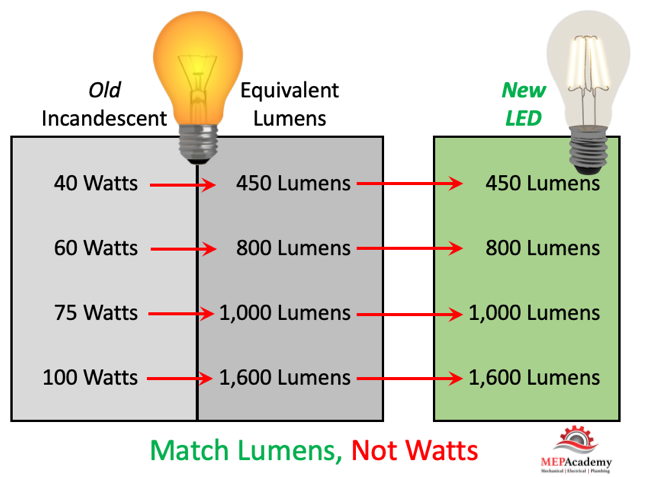
When changing from incandescent to LED or other energy saving bulb, it’s the lumens that represents the brightness, not the wattage. If you maintain the same distance from the light bulb to the floor or task area, then getting the equivalent lumens should work.
Here is a rule of thumb from the government energy savers program.
When replacing an incandescent bulb
- Replace a 100-watt incandescent bulb with a light bulb that provides about 1,600 Lumens.
- Replace a 75-watt light bulb, with one that provides about 1,100 lumens.
- Replace a 60-watt light bulb, with one that provides about 800 lumens.
- And replace a 40-watt light bulb, with a light bulb that provides about 450 lumens.
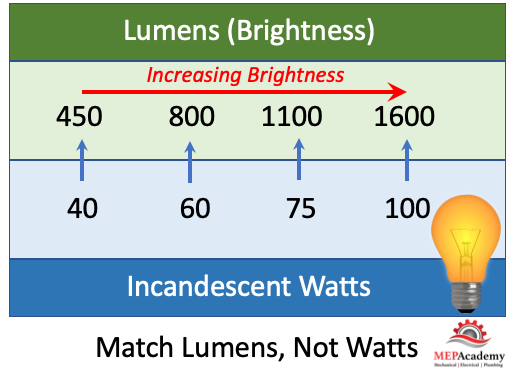
Lighting Facts Label
When shopping for light bulbs, look at the label on the package and you should see the lumens listed as shown here.
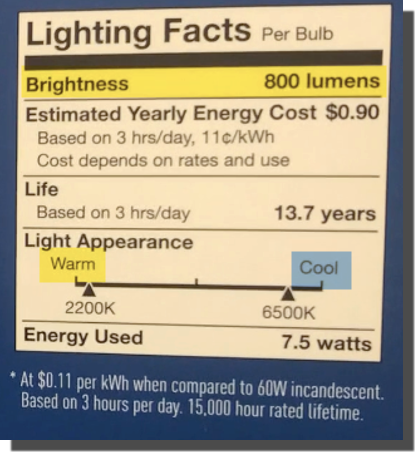
The label will provide you with the lumens, the estimated savings based on an assumption of your cost per kw, the projected life of the bulb based on daily hours used, the appearance of the light from a warm yellowish color to a cooler blue appearance, and the energy consumed in watts.
What is a Footcandle?
A footcandle is defined as a measurement of the light’s intensity. One foot candle equals the amount of light to saturate a one-foot square with one lumen of light.
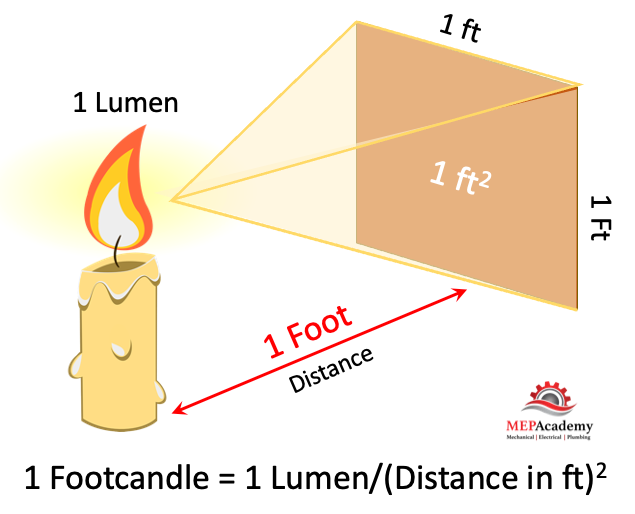
What this means is that the number of lumens produced by the light source, whether that’s an office light fixture or a lamp at home is measured not by how many lumens leave the bulb, but by how many reach the surface being measured and it’s expressed in foot candles.
Footcandles would tell us how much of the light that leaves the fixture arrives at the surface where it’s needed.
Why use Footcandles
Using footcandles allows different sources of light to be compared and provide a standard that can be measured. Footcandles are directly affected by the distance from the source of lumens and can be expressed in a simple formula.
Footcandles = Lumens/ (Distance in Feet)2
This makes the distance from the source a main factor, and the distance works inversely with the footcandles.
If you had a 10-Watt LED light with 800 Lumens, then you could figure your footcandles using the formula starting with the lamp 1 foot off the floor we get
- Footcandles = 800 Lumens / (1 foot) 2
- Footcandles = 800 / 1 = 800 Footcandles.
The lumens and the footcandles match as the distance is only 1 foot.
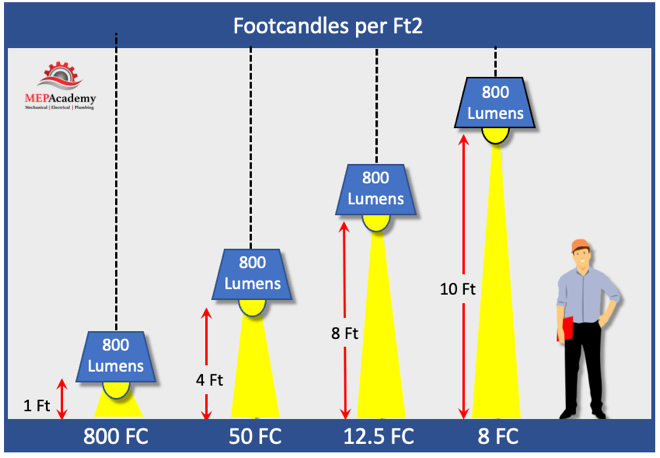
Moving the lamp to 4 feet above the floor we now get
- Footcandles = 800 Lumens / (4 feet) 2
- Footcandles = 800 Lumens / (16) = 50 FC
Again, this time at 8 feet above the floor we get
- Footcandles = 800 Lumens / (8 Feet) 2
- Footcandles = 800/64 = 12.5 FC
Using that same 10-watt LED light, but hanging it at 10 feet, instead of 8, the footcandles or amount of useful light changes at the surface.
- Footcandles = 800 Lumens / (10 feet) 2
- Footcandles = 800/100 = 8 FC
This clearly shows the relationship between distance and footcandles, and that the lumens can remain the same but have very different results based on height.
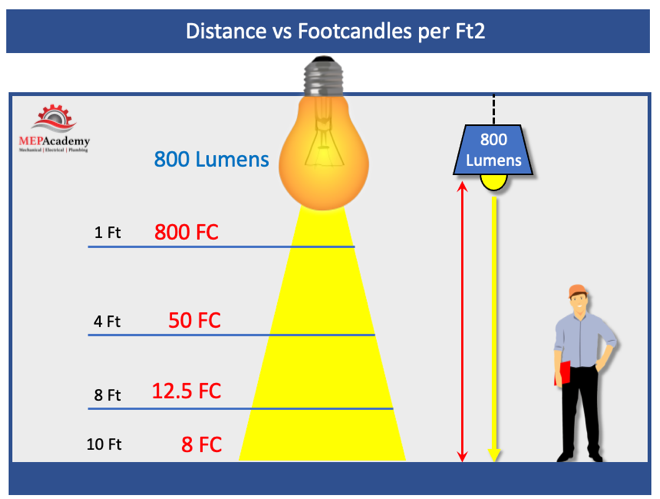
This is common sense to all of us, but this formula makes it easy to calculate the affect and gives illuminating engineers something to use in laying out the lighting design to ensure proper lighting for the various areas of the building.
We can see that if the distance is only 1 foot, then our lumens will equal our footcandles as that is the definition.
What does the IES Recommend?
The IES, or better known as the Illuminating Engineering Society provides a standard for lighting levels for various surfaces, such as the following: Operating room 1,000 Footcandles. This is definitely important because the medical staff needs to see clearly. Classrooms 100 footcandles, Gymnasium 100, offices 50, factory floor 30, hallways 10 and a parking lot only 2 footcandles.
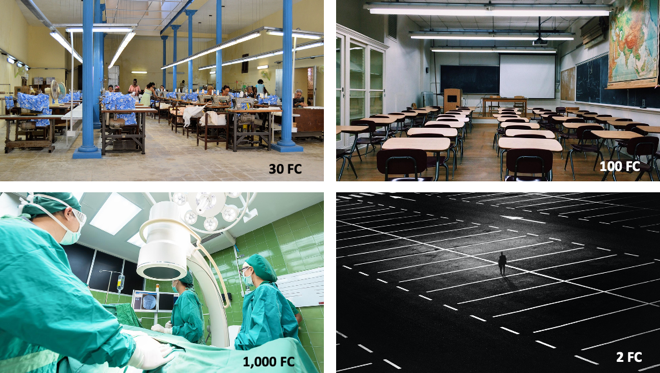
For anyone trying to read in a parking lot at night, now you know why its difficult, because they’re only designing to achieve a few footcandles of light.
LUX and the Metric System
For those using the metric system, this would be expressed in LUX. One footcandle is equal to 10.764 Lux.
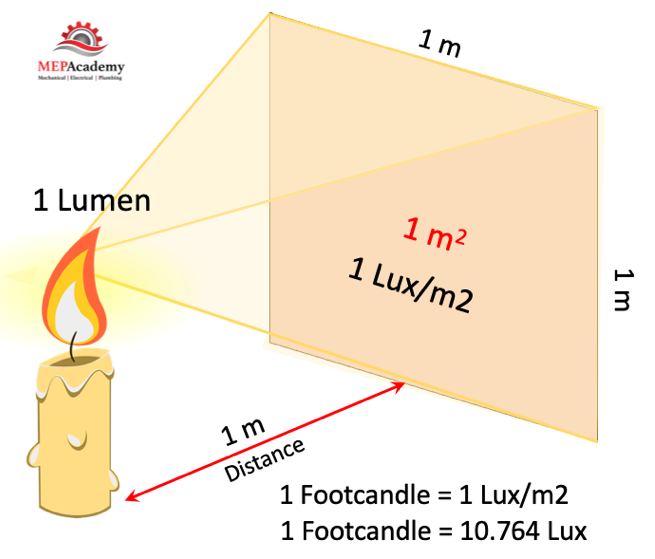
Remember that our formula for footcandles was based on 1 square foot. Since a square meter has 10.764 square feet, then we need to multiply our footcandles by 10.764 to get the equivalent footcandles/m2.
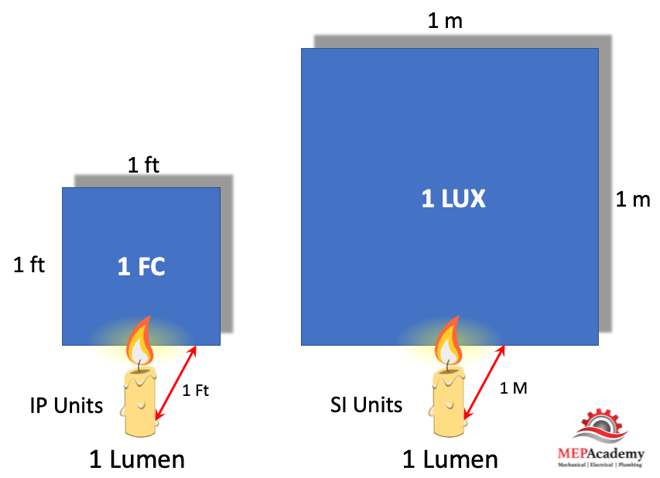
It’s the same amount of footcandles, it’s just expressed for a larger area, because instead of 1 square foot, we are using 10.764 square feet or 1 square meter.





















